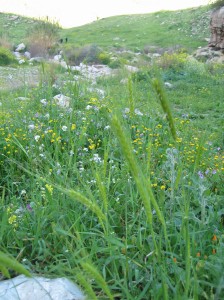A follow up on the Aviv Barley on Sunday March 27, 2016. Find out what happens when agricultural reality collides with…
Posted by Nehemia Gordon on Sunday, March 27, 2016
Tag Archives: Abib
Is There Aviv Barley in the Land of Israel Now…or Not?
This year there has been some confusion as to whether the barley in the land of Israel was really aviv (or abib) or not. Some aviv barley search groups say yes, and some say no. Why the confusion, and who is right? Eventually each person has to make up their own mind, but below we will present the reasons why we agree with those who say that the barley isn’t aviv yet.
At this point, some of you may be saying, “Huh?” when it comes to the term aviv barley. What is aviv barley and what does that have to do with anything that pertains to me? So let’s quickly review some basic truths regarding the biblical calendar. It all has to do with when to keep the biblical feasts.
The Bible stipulates that months on the biblical calendar begin when the new moon is sighted. (I’ve already written several article on this subject, so I won’t give all the Scripture references here. For that info, go to http://www.hoshanarabbah.org/teaching.html#feast.) To know the dates of the biblical feasts, one must know when the months begin. To know this, one must know when the biblical new year begins—that is, when the first day of the first month of the biblical new year is.
On our modern Roman calendar, determining new year’s day each year easy to do. But this is not the case with the biblical calendar. This is why. The Roman calendar is based on the solar cycle, which is 365 1/4 days long. By contrast, the biblical calendar is a luni-solar calendar. This means it’s based on the solar cycle AND the lunar cycle. The latter is only 354 days long, or roughly 11 days shorter than the Continue reading
What’s the Big Deal About Abib Barley? It’s in the Bible, so you need to know!
Exodus 9:31, The barley was in the head. Barley was cultivated as a grain crop in ancient Egypt, as well as in Israel, and grows wild like a weed throughout the region to this day. Several passages in the Scriptures witness to the fact that the barley was the indicator of which month was to be the first month of the year for the Israelites, so that they could determine when the biblical feasts were to be observed.
Observe the month of Abib, and keep the Passover unto YHVH your Elohim: for in the month of Abib YHVH your Elohim brought thee forth out of Egypt by night. (Deut 16:1, emphasis added)
Please notice, the definite article the proceeding the phrase “month of Abib.” The state of the barley indicates a specific month in the spring. Months in the biblical Hebrew calendar have always been determined by the first visible sliver of the new moon from antiquity. This specific month is to be the beginning the biblical new year (Exod 12:2). The month of the Abib is not so much the name of a month as it is a description of the month. Below are listed the other three places in the Scriptures where this phrase is found.
This day came you out in the month Abib. (Exod 13:4)
You shall keep the Feast of Unleavened Bread: (you shall eat unleavened bread seven days, as I commanded thee, in the time appointed of the month Abib; for in it you came out from Egypt: and none shall appear before me empty). (Exod 23:15)
The feast of unleavened bread shall you keep. Seven days you shall eat unleavened bread, as I commanded you, in the time of the month Abib: for in the month Abib you came out from Egypt. (Exod 34:18)
What does the word abib in the phrase “the month of the Abib (or Aviv)” mean? Continue reading


